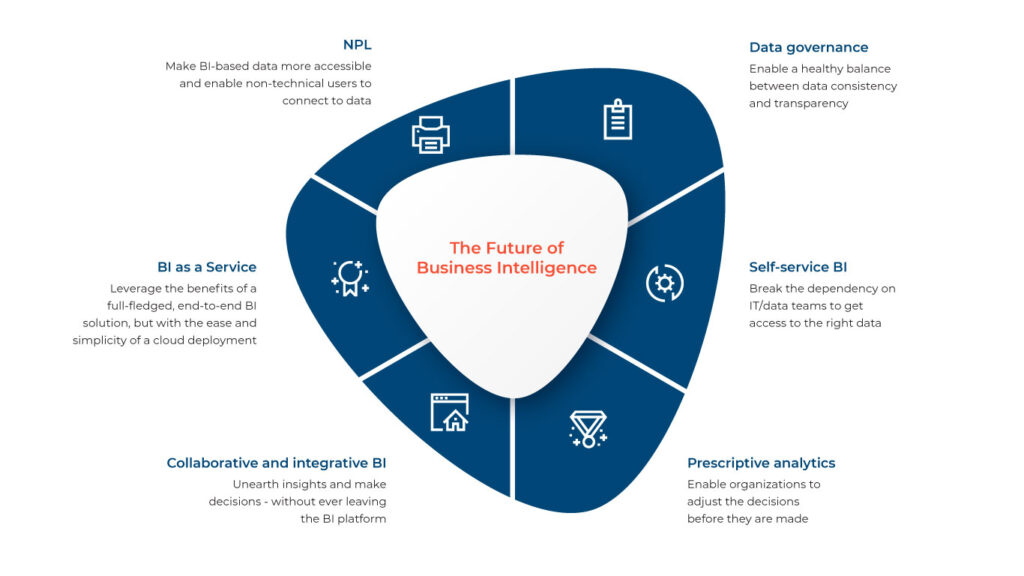As we continue to live in a world driven by data, the importance of business intelligence continues to grow. Business intelligence is the process of collecting, analyzing, and presenting data to help businesses make informed decisions. However, with the rise of artificial intelligence and machine learning, one may wonder if business intelligence has a future.
While there is no doubt that the field of business intelligence is evolving, it is important to understand that it is not going away anytime soon. In fact, with the increasing amount of data available and the need for businesses to make quick and informed decisions, the demand for business intelligence professionals is only going to rise. It is important for businesses to continue investing in business intelligence tools and technologies to stay competitive in today’s data-driven world.

Does Business Intelligence Have a Future?
Business intelligence (BI) is a type of technology that enables organizations to analyze large amounts of data to gain insights and make better decisions. It has been around for decades, but with the recent advances in technologies such as big data, the Internet of Things (IoT), and artificial intelligence (AI), it has become an even more integral part of organizations’ strategies. So, does business intelligence have a future?
The Growing Demand for Business Intelligence
The answer is a resounding yes. The demand for BI is growing rapidly as organizations of all sizes realize the potential of using data to make better decisions. According to Gartner, the global business intelligence and analytics market is expected to reach $22.8 billion by 2022, up from $18.3 billion in 2018. This is because organizations are increasingly using data to inform their decisions, from customer segmentation to predictive analytics.
When it comes to business intelligence, organizations are looking for solutions that can help them make sense of their data. This includes tools such as data visualization, data mining, and advanced analytics. These tools enable organizations to quickly and easily analyze their data, giving them insights into trends and customer behavior.
The Benefits of Business Intelligence
Business intelligence provides organizations with a variety of benefits. For starters, it can help organizations make better decisions. By analyzing data, organizations can identify patterns and trends that can inform their decisions. This can help them make smarter investments and maximize their ROI.
In addition, BI can help organizations reduce costs. By analyzing data, organizations can identify areas where they can reduce costs and improve efficiency. This can help them save money in the long run.
Finally, business intelligence can help organizations gain a competitive edge. By analyzing data, organizations can find insights that their competitors may not have access to. This can give them an edge in the market.
Conclusion
In conclusion, business intelligence is here to stay. As organizations realize the potential of using data to make better decisions, the demand for BI is only going to increase. With the right tools, organizations can gain insights that can help them make better decisions, reduce costs, and gain a competitive edge.
Frequently Asked Questions
Business intelligence (BI) is the process of gathering, storing, analyzing and providing access to data to help businesses make better decisions. It is an essential part of any successful organization and is used to identify trends, measure performance and support decision making.
Does Business Intelligence Have a Future?
Yes, business intelligence has a very bright future. In today’s world, businesses rely on data more than ever before. Business intelligence technologies are constantly evolving to meet the growing demands of organizations. New technologies, such as machine learning and AI, are being used to automate data analysis, making it easier for businesses to extract insights from their data and use them to make decisions. Additionally, the increased availability of cloud-based solutions is making it easier for businesses to access and use data from anywhere, anytime.
The future of business intelligence is bright, as it will continue to evolve to meet the changing needs of businesses. New technologies, such as natural language processing and predictive analytics, are rapidly becoming available, providing businesses with powerful tools to help them make better decisions. Additionally, the cloud is enabling businesses to access their data from anywhere, making it easier and more efficient to analyze and interpret data. As these technologies continue to grow, business intelligence will remain an important part of any successful organization.

Beyond Dashboards: The Future Of Analytics And Business Intelligence?
In conclusion, the future of business intelligence looks bright. With the increasing amount of data being generated by businesses and the growing demand for data-driven decision making, there is a clear need for business intelligence solutions. As technology advances, we can expect to see even more sophisticated tools and techniques being developed to help businesses gain insights from their data.
However, it’s important to note that the success of business intelligence ultimately depends on how well it is implemented and utilized by organizations. Companies must invest in the right tools and personnel to ensure that they are making the most of their data. As long as businesses continue to prioritize data-driven decision making and invest in the necessary resources, business intelligence will undoubtedly have a prominent role in shaping the future of business.


